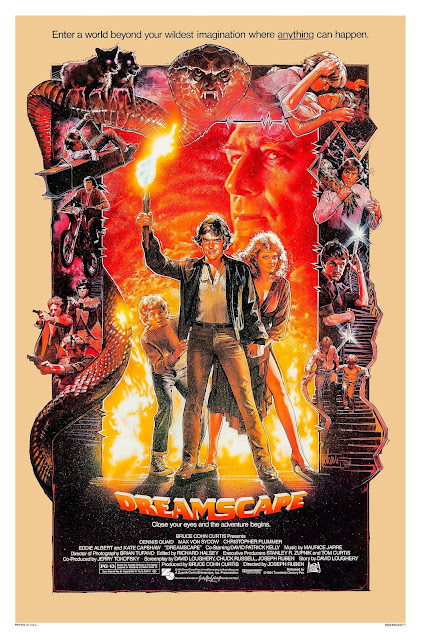Dreamscape
Director ~ Joseph Ruben
Writers ~ David LougheryChuck RussellJoseph Ruben
1984, USA
Stars ~ Dennis Quaid, Max von Sydow, Christopher Plummer
If you’re looking for an 80s sci-fi thriller, there are probably none more 80s than ‘Dreamscape’, much of the blame of which can be put on Maurice Jarre’s synth-score, which is sometimes/often unintentionally amusing. But when Dennis Quaid outwits some small-time crooks on a racecourse and goes home to fawning answerphone messages from women, then picks up a saxophone to chill with to establish his cool, there can surely be no doubt of the era. Also, the smirky Quaid poster than implies this is some kind of Indiana Jones romp wannabe is criminally misleading when it is more derived more from the psychic thrillers of the 70s and the post-‘Nightmare on Elm Street’ dream-horrors of the era. But maybe the awkward poster-image is indicative of the marketing confusion of how to sell a nightmarish-lite thriller-horror that is a little tonally muddled.
There’s some love interest in a lab coat, but this is a boys’ tale. When you have Christopher Plummer and David Patrick Kelly in the cast, you know who the bad guys are (and Kelly will never be cool enough to play sax), and there you have Max Von Sydow making the cheesiest of dialogue and exposition sound credible (“Project!”). It’s also defiantly rooted in its era for its Cold War Nuclear fears: the President is having dreams of Nuclear Holocaust that are making him lean towards a disarmament deal which doesn’t sit well with the political Hawks around him. The political paranoia and conspiracies are familiar from Seventies psychic horrors like ‘Scanners’ and ‘Fury’, although the dream angle comes as a new spin, although it’s only the wonky dreamscape staircase that truly tests the surrealist realism of dreams. The nadir is the gong for a punchline for its one Asian character, but the glaring flaw is its central Snakeman terror that, with all the best will in the world, with its inconsistent design that veers between rubberiness and Harryhausen charm, doesn’t inspire anything terrible.
But it is a film that is entertaining because of and for all its flaws, for the nostalgia. Shallow, but it ultimately does achieve some campy romp.













